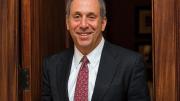Before she read a poem written in celebration of Swartz Hall—the just-renovated home of Harvard Divinity School—Jorie Graham, Boylston Professor of Oratory and Rhetoric in the Faculty of Arts and Sciences, said that she had never been to a building dedication that felt like a spiritual event. Her words captured beautifully a sentiment shared by all who were in attendance, especially Susan Shallcross Swartz and her husband, Jim, whose generosity inspired and launched the project in 2019. Though the pandemic delayed the ribbon-cutting for longer than anyone imagined possible, the moment turned out to be exactly what everyone needed: a blue-skyed affirmation of our community and the spaces we create together to nurture it.
Our Divinity School now has a physical home befitting its vision to “provide an intellectual home where scholars and professionals from around the globe research and teach the varieties of religion, in service of a just world at peace across religious and cultural divides.” Everywhere, there are accessible spaces that invite the exchange and expansion of ideas, from classrooms featuring the latest technology to corridors and corners welcoming spontaneous conversation. A renewed chapel bears the name of Preston N. Williams, a beloved member of the Divinity School faculty who was the first African American to receive tenure there and the first to lead the School as acting dean. Complementing the chapel is a large and airy multi-faith space that can be customized—with meditation cushions, moveable seats, prayer rugs, and more—to meet the needs of any practice. It is a place unlike any other on our campus.
In these thoughtfully designed spaces thrive students who represent more than forty faith traditions, as well as no faith traditions, whose interests and aspirations are as varied as their backgrounds. What began as our nation’s first nonsectarian theological school is today its most religiously diverse and, I would argue, dynamic. Some students come to the Divinity School to pursue ministry studies in preparation for service to others or to broaden and deepen their existing skills; some come to engage in research and scholarship in religion and theology; some come to weave together threads that run through our University and beyond. Engaged with our extraordinarily talented faculty, our students shape their courses of study in preparation for work not just in ministry and education, as one might imagine, but also in business, law, public policy, public service, the list goes on.
Underlying this extraordinary range of efforts is a commitment to religious literacy—and an understanding that religion has an impact on nearly every area of human endeavor. In recognition of that fact, the Divinity School announced last year the creation of its first new degree program in more than half a century. The Master of Religion and Public Life, which just welcomed its inaugural cohort this fall, prepares students to make a greater difference in their professions through deeper understanding of religious traditions and values. How do they expand or shrink opportunities for meaningful change? How can religious traditions be marshaled to create connections rather than erode them, to resolve conflict rather than fuel it? These questions can—and will—yield answers for all of us in the years ahead.
At a moment when growing tension between modernity and fundamentalism threatens much of the world, Harvard Divinity School is both a balm and a beacon. It is a special community that welcomes eagerly some of the greatest challenges of our day, considering, questioning, and facing them with a combination of care, humility, and respect. I am eager to see the ways in which Swartz Hall supports and advances the work of individuals committed to strengthening and building the kinds of communities they hope to see in the world. Their work makes me optimistic about our future, about the possibility of a just world, a world at peace.
Lawrence S. Bacow
President









